5 Best Web Development Courses to Take in 2024
Learn how to build websites in this guide with the best web development courses.
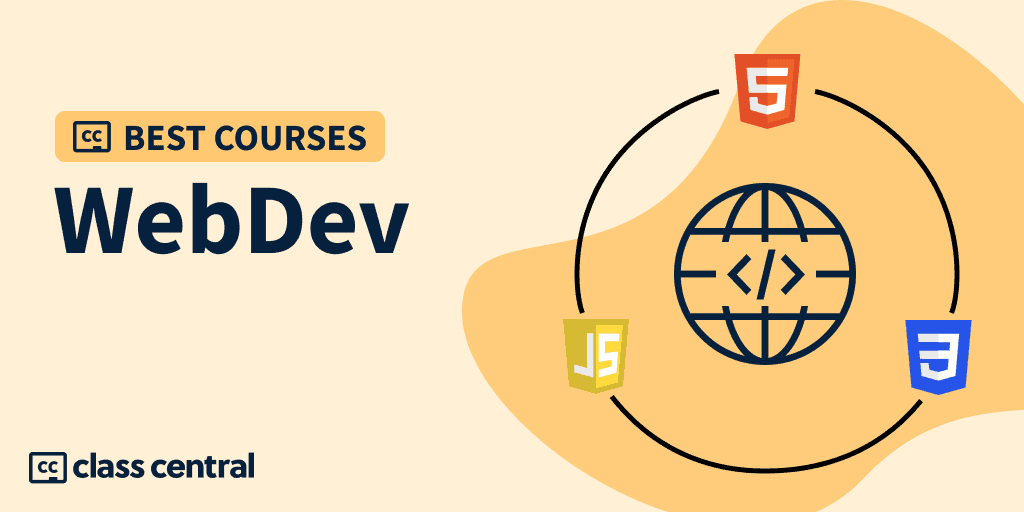
Web development involves designing, coding, and maintaining websites using a variety of programming languages such as JavaScript, HTML, CSS, PHP, and more. Three of the most important languages used in web development are HTML, CSS, and JavaScript, which are universally used for creating front-end applications.
Everyone learns differently, and I hope to provide you with a variety of courses to learn web development from start to an intermediate level.
Class Central recommends Responsive Web Design by freeCodeCamp as the best way to start learning HTML and CSS, and Foundations: Web Development by The Odin Project as a complete learning path to become a full-stack web developer with a follow-up course on full-stack JavaScript. Both platforms are interactive and self-guided, where you actually code things yourself.
If you need more guidance, with the presence of an instructor, Learn HTML and CSS and Learn Javascript by Scrimba will provide you with lectures and an interactive platform to code along. However, they may not be suitable for complete beginners.
If you wish to start your journey in web development, read on for more to see my top picks! Click on one to skip to the course details:
| Course Highlight | Workload |
| Best Course for Beginners with Certificate by freeCodeCamp | 300 hours |
| Best Instructor-led Course by Scrimba | 40 hours |
| Best Text-Based Course for All Levels by Mozilla | 270 hours |
| Best Full-stack Learning Path by The Odin Project | 300 hours |
| Best University-level Course with Certificate by John Hopkins University | 40 hours |
Why WebDev
Websites can range from single static pages of plain text to complex interactive web applications. Web development requires a basic understanding of HTML, CSS, and JavaScript, which are the three technologies at the heart of the web.
Web development is a rapidly growing industry. The U.S. Bureau of Labor Statistics predicts a 23% increase in web development job opportunities from 2021 to 2031, much faster than the average growth rate for all occupations.
For these reasons, JavaScript is the most popular language, and HTML/CSS comes in second, according to the Stack Overflow Developer Survey. Developers are often paid over $60K yearly.
Why You Should Trust Us
I started learning web development in January 2022 with Mozilla’s front-end course, despite having no prior knowledge of HTML and CSS. Although I had some experience with Python, the prospect of learning HTML/CSS felt daunting and overwhelming, like any other new language. I was even intimidated by it.
Around the same time, Class Central announced an online bootcamp with Ramon and Jess as mentors. I enrolled in the bootcamp with the intention of returning to Mozilla or The Odin Project once I completed it. I nearly finished the Responsive Web Design bootcamp before moving on to learning about responsive layouts and design. I practiced my skills by replicating parts of websites I came across, using what I had learned.
While creating these webpages, I frequently referred back to Mozilla’s documentation, Kevin Powell’s Youtube Channel, Web Dev Simplified FollowAndrew’s Youtube Channel, and a few other channels to gain a better understanding of concepts that still troubled me. These channels are among the best resources for learning web development, and I recommend subscribing to them for the latest updates and insights on HTML/CSS and JavaScript.
If you do need more help in understanding responsive layouts and positioning, I definitely recommend looking at the 14 Best Free CSS Layout Courses.
By the end of it all, I completed parts of almost all the courses mentioned below since they provide different ways of learning things, and I fell in love with HTML/CSS. Here are examples of a few of the things I’ve created recently:
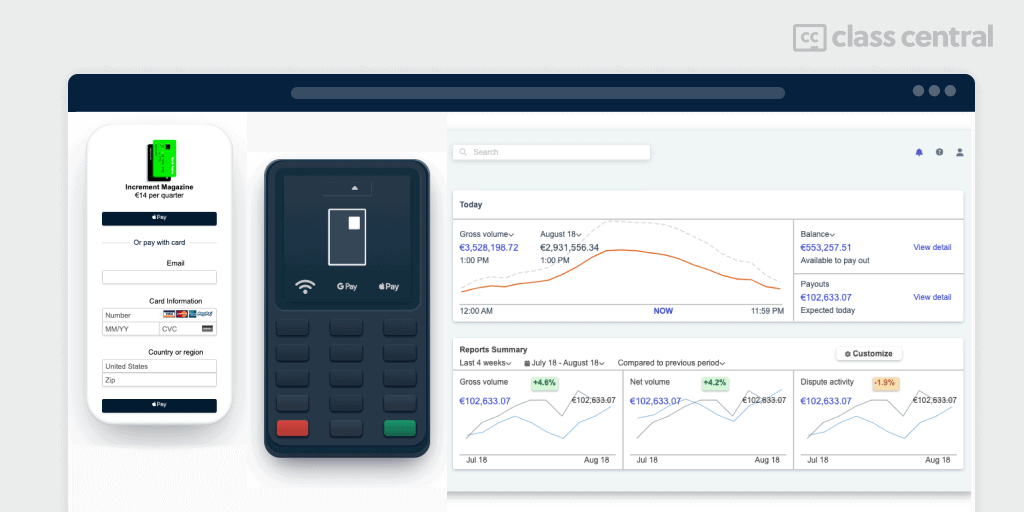
Best Courses Guides Methodology
I built this ranking following the now tried-and-tested methodology used in previous Best Courses Guides (you can find them all here). It involves a three-step process:
- Research: I started by leveraging Class Central’s database with 100K online courses and 200K+ reviews. Then, I made a preliminary selection of courses by rating, reviews, and bookmarks.
- Evaluate: I read through reviews on Class Central, Reddit, and course providers to understand what other learners thought about each course and combined it with my own experience as a learner.
- Select: Well-made courses were picked if they presented valuable and engaging content and they have to fit in a set of criteria and be ranked accordingly: comprehensive curriculum, affordability, release date, ratings and enrollments.
Course Ranking Statistics
Here are some aggregate stats about the ranking:
- All of the courses in this ranking are free except for the last course.
- They are all suitable for beginners.
Best Course for Beginners with Certificate by freeCodeCamp
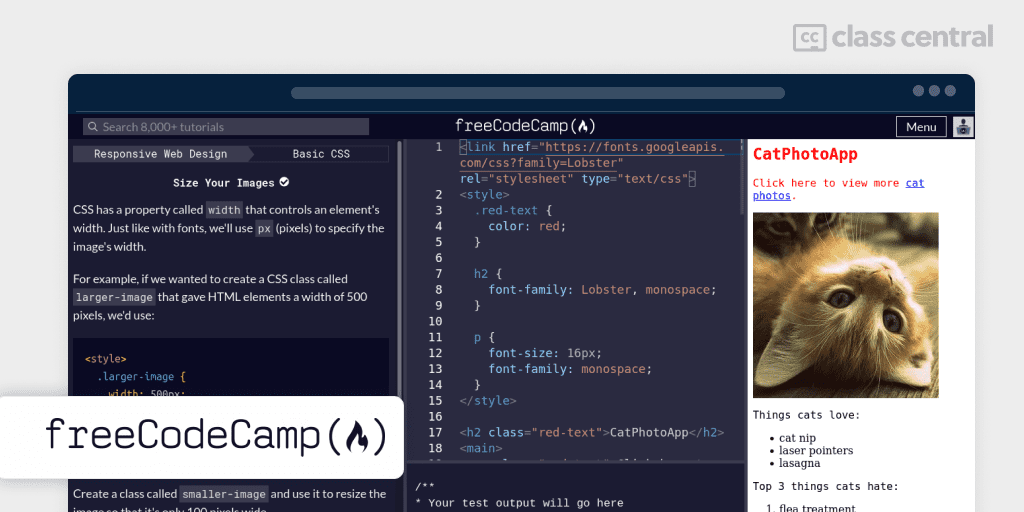
freeCodeCamp has recently updated its Responsive Web Design course to be more project-based, making it an excellent resource for beginners who want to start coding without having to set anything up on their computers. The course covers the basics of creating simple websites and CSS artwork, introducing you to HTML and CSS syntax. Upon completion, you’ll receive a free certificate.
While this course is considered one of the best resources for web design, it may not provide sufficient understanding of the concepts for some. Some exercises might feel too prescriptive, and if you have basic knowledge of HTML and CSS, exploring other courses on this list might be a better option.
To make the most out of the course, it is recommended to install an Integrated Development Environment (IDE) like Visual Studio Code and create folders with project names and files inside them. As you progress through the course, copy the entire HTML and CSS code to review later. The interactive tool provided by freeCodeCamp opens each part of a project, allowing you to enter code precisely where required. However, this approach may be too direct for some who prefer to code alone.
freeCodeCamp also offers a JavaScript course with a free certificate: JavaScript Algorithms and Data Structures.
What You’ll Learn
The course covers the basics of HTML/CSS, including responsiveness in web design. By the end of the course, you’ll be able to create your own portfolio.
How You’ll Learn
The course is project-based, with bite-sized exercises leading to the final project. You will learn by coding in each step’s own coding environment, and if you’re familiar with Visual Studio Code, you can even use some of the shortcuts from the IDE.
| Provider | freeCodeCamp |
| Level | Beginner |
| Workload | 300 hours |
| Certificate | Yes, free |
- Once you have completed this course, if you wish to create a fairly bigger project, you can look at Frontend Development – Create a Blog with HTML, CSS and Javascript from freeCodeCamp.
- freeCodeCamp has its own forum, where you can post your work and get feedback from fellow learners.
Best Instructor-led Course by Scrimba
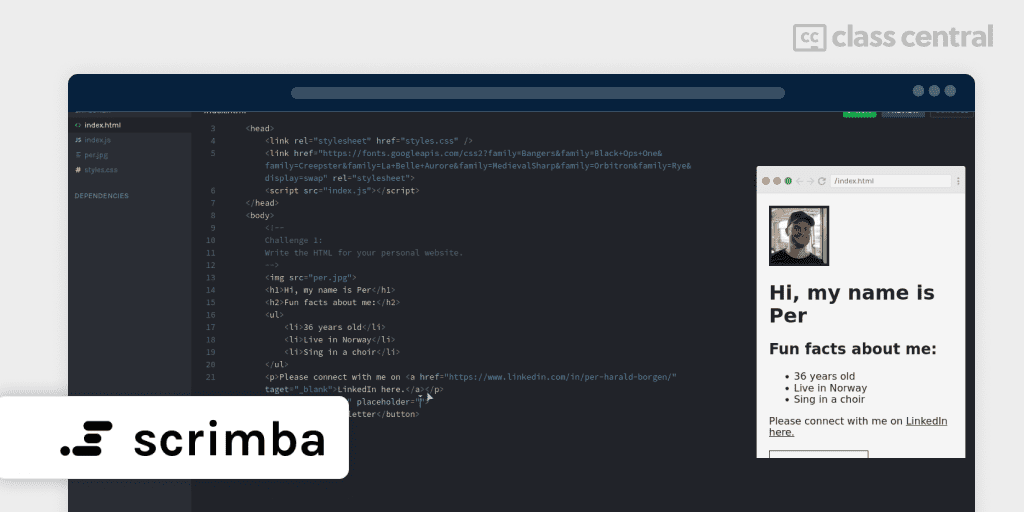
If you’re looking for an interactive platform to learn HTML/CSS, JavaScript, and Responsive Web Design with a variety of tutors, Scrimba is a great option. Their Learn HTML and CSS and Learn Javascript courses offer concise, interactive lessons with practical examples. In addition, Scrimba has comprehensive courses on CSS Grid and Flexbox, as well as other programming languages and frameworks. The final project on the platform is a solo project that can be reviewed for feedback.
As a beginner, I found it helpful to complete a few projects on freeCodeCamp before moving on to Scrimba to gain practical experience in creating websites.
What You’ll Learn
You’ll learn the fundamentals of HTML/CSS and JavaScript, with practical examples and the ability to push your work to GitHub and deploy it.
How You’ll Learn
Scrimba’s interactive platform allows you to understand the requirements and code them yourself, with instructors helping you understand the code while they write and explain it.
| Provider | Scrimba |
| Instructor | Per Harald Borgen |
| Level | Beginner |
| Workload | 45 hours |
| Certificate | None |
Fun Facts
- Kevin Powell also has an HTML/CSS Crash Course.
- You can also learn about CSS Variables by Scrimba.
- Among the paid courses, I recommend the frontend web development Career Path and also deepdive into Javascript along with a course on Responsive Web Design.
Best Text-Based Course for All Levels by Mozilla
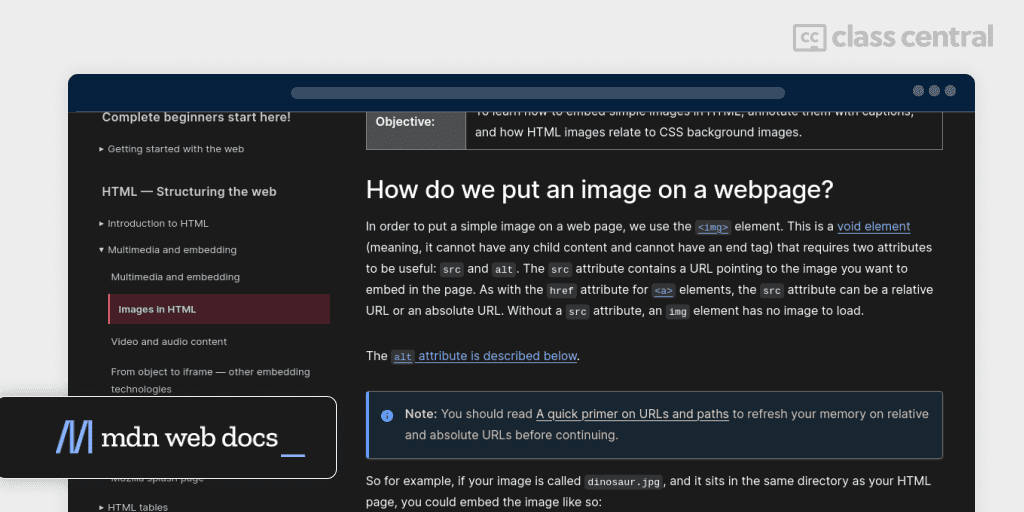
Who better to teach web development than the developers themselves? Mozilla is one of the best platforms for learning web development through simple exercises and in-depth reading materials. While videos and interactive platforms can be helpful, if you’re looking for a more profound understanding of the basics of web development and beyond, I recommend exploring text-based platforms.
Although freeCodeCamp is an excellent starting point for web development, I highly recommend Mozilla’s Front-end Web Developer course. This comprehensive course covers HTML semantics, CSS, JavaScript, accessibility, performance, tools, frameworks, and even some server-side programming. After completing this course, you will have the skills and projects necessary to work as a junior developer.
How You’ll Learn
The course is entirely text-based, but each module includes small challenges to apply the concepts you’ve learned. You’ll also have access to additional resources such as interactive examples, quizzes, and projects to reinforce your understanding.
| Website | Mozilla |
| Level | Beginner |
| Workload | 270 hours |
| Certificate | None |
Best Full-stack Learning Path by The Odin Project
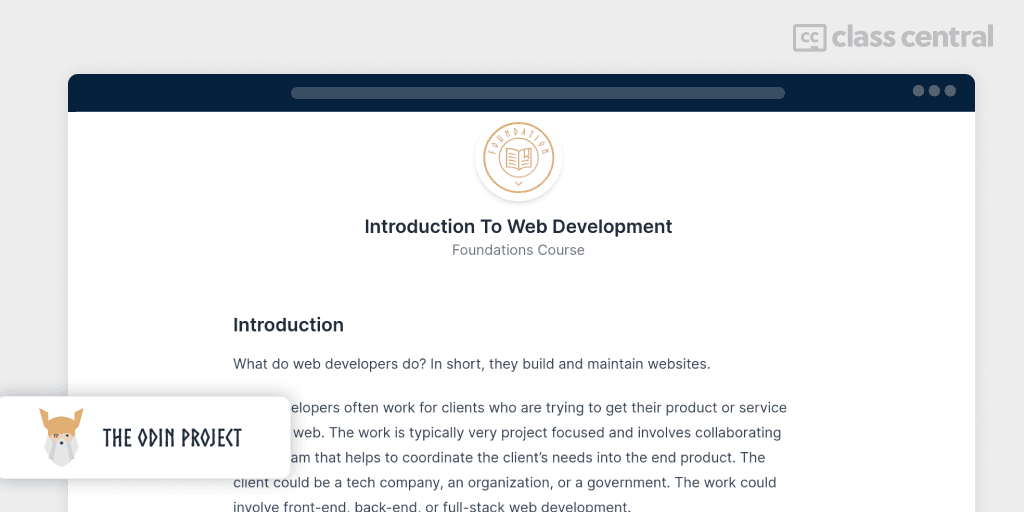
The Odin Project offers two options for learning web development: you can begin with the Foundations: Web Development course, which includes small exercises and projects covering HTML, CSS, and JavaScript, or you can take the entire course and become a full-stack developer. After completing the Foundations course, you can move on to the Full-Stack JavaScript course. If you prefer to learn a different programming language, The Odin Project also offers a full-stack course with Ruby on Rails.
The Odin Project relies heavily on MDN Documentation and requires knowledge of Github to push your projects. The courses prepare you to work as a junior full-stack developer upon completion.
What You’ll Learn
You will learn the fundamentals of HTML/CSS and Javascript. The Odin Project also introduces you to git and GitHub since projects will require you to push your challenges after completion on GitHub. You can move at your own pace and proceed to learn full-stack development with either Ruby or Javascript.
How You’ll Learn
The Odin Project requires you to do a lot of reading and then complete small challenges once you are familiar with the concepts. You will also come across some YouTube videos and MDN Docs that you’ll have to watch or read to master certain concepts.
| Organization | The Odin Project |
| Level | Beginner |
| Workload | 300 hours |
| Certificate | None |
Fun Facts
- They have their own Discord Channel, where you could ask questions if you are stuck.
Best University-level Course with Certificate by John Hopkins University
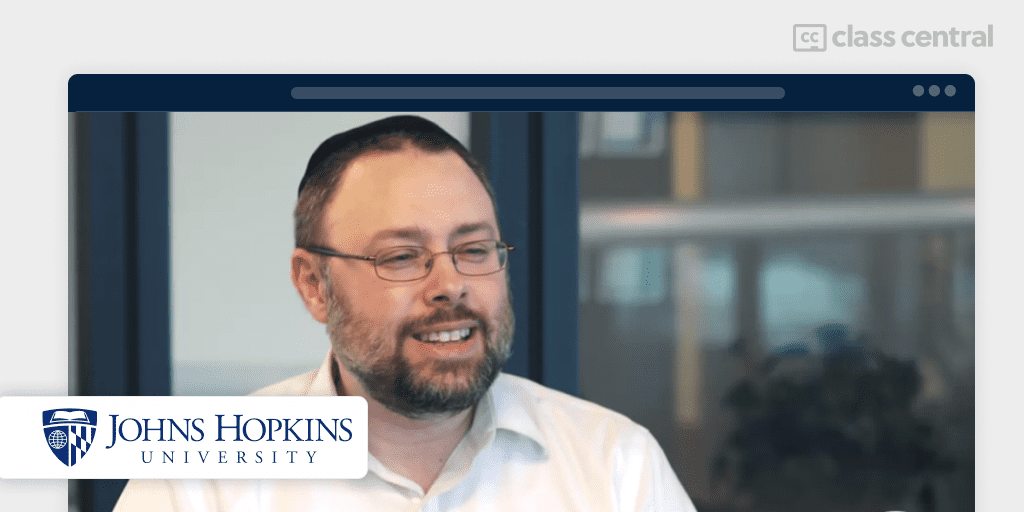
The free-to-audit HTML, CSS, and Javascript for Web Developers course, offered by Johns Hopkins University on Coursera, goes beyond teaching the fundamentals of web development. It provides hands-on experience in building real-world applications, allowing students to apply their knowledge practically. The course covers the “why” behind all concepts, making it valuable for both beginners and experienced developers. By the end of the course, you will have created a responsive website that functions seamlessly on all devices.
What You’ll Learn
The course starts by teaching you how to use HTML, CSS, and Bootstrap (the most widely used CSS framework) to create modern web pages from scratch. You’ll then learn how to make your designs “responsive” by coding your web page so that everything rearranges and resizes automatically according to the size of the user’s screen, be it a smartphone or a desktop. This skill is crucial since many internet users access the web on their phones.
Finally, the course delves into JavaScript, the most popular language of the web. You’ll use JavaScript to build a fully functional web application that leverages Ajax technology. Ajax allows specific parts of a webpage to be updated, saving bandwidth and making the web page more responsive. For example, when navigating a website, the navigation bar remains the same, and only the main content changes. Ajax reloads only the main content, resulting in a more efficient and snappy webpage. To put it differently, Ajax retrieves data from the server and dynamically updates the content without having to reload the entire page.
How You’ll Learn
The course is broken down into five weeks, each requiring two to three hours of work. It includes short videos, readings, and practice exercises, with a focus on real-world applications. One of the course’s unique features is that students get to work on a website from scratch for a local business in Baltimore after a virtual field trip, guided by Yaakov Chaikin.
Regarding assessments, each week includes lots of practice exercises. Week one has a graded quiz, while the remaining weeks have peer-graded assignments (for paying learners).
Note that you’ll need a GitHub account to submit your projects. This is true for many Johns Hopkins’ computer science courses. GitHub is a very popular tool in web development anyways, so it’s well worth creating a free account.
| Institution | John Hopkins University |
| Provider | Coursera |
| Instructor | Yaakov Chaikin |
| Level | Beginner |
| Workload | 40 hours |
| Rating | 4.7/5.0 (13k) |
| Enrollments | 682k |
| Certificate | Paid |
One Thing to Note
This is an old course, but the fundamentals are solid, and that matters most. It uses an older version of Bootstrap (Bootstrap 3), but if you understand version 3, you can easily work with the latest version 5. The principles behind web development remain largely the same.
Fun Facts
- This course is part of the Ruby on Rails Specialization, but you can take it independently. So you don’t have to worry about the rest of the specialization in order to complete this course!
- The course is one of Class Central’s Most Popular Online Courses of All Time.
- Both of Chaikin’s courses, HTML, CSS, and Javascript for Web Developers, and Single Page Web Applications with AngularJS, made it to the #1 Top Rated Course spot on Coursera back in 2016.
- Yaakov Chaikin has co-authored the book, “Core Servlets and Javaserver Pages: Advanced Technologies”.
Honorable Mentions
You should definitely check out Kevin Powell’s course on responsive layouts. I’d also like to recommend Colt Steele’s course, which covers the basics over several videos, and Coder Coder, which offers helpful resources for learning HTML/CSS and Javascript through projects.
Time for Practice
Once you’ve completed these courses and have a good understanding of the concepts, it’s essential to put them into practice. Practicing on any website can be helpful for improving your HTML/CSS and Javascript skills. For example, I’ve tried recreating parts of a website like stripe.com without looking at their code or console can be an excellent exercise. There are also many other websites where you can practice, such as Frontend Mentor Challenges, Befront, Codepen Challenges, Codewell, CSS Battle, and moderncss.dev.

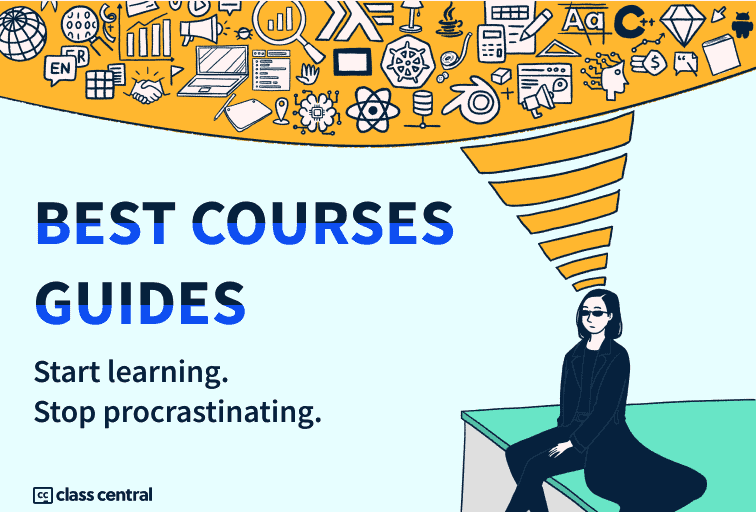






Gasinu Felix
Thanks for your help
Sonal
Love this initiative to recommend 10 best courses for skill development.
I wonder if you research in selecting these also include accessibility for disabled.
There are over 1 billion disabled in this world and most of them rely on assistive technologies to access online material. I see that most of these classes are on accessible platforms, still, accessibly of the content is equally important. I love unbiased and authentic evaluation by Class Central.
I can attest that your choice #1 and #10 are both accessible courses, as, I know of quite a few visually challenged learners have completed these class and based on their recommendation the course providers have actually modified the courses. Both classes have originated from Cambridge, MA.
sahand
Hello,
Thank you for the comprehensive list!
Can you clarify why Helsinki university’s Full Stack-Open course didn’t make the list?
Kinjal
The full stack course by Helsinki would be on top of the list for a full-stack best course guide. But since this is more about getting acquainted with the technologies especially HTML/CSS and Javascript, it is not mentioned in the list.
I hope that clarifies it 🙂
Charles
I like your article. Clear, concise, and helpful in guiding me to choose appropriate course for web-development.
Nassar Salih
Thanks so much dear Kinjal Vora for your nice article .Realy I benefit much from it. Insha’Allah I will follow your advices and begin from top to end .Thanks again Mr Kinjal Vora may Allah belss you .
Nihal HU
How i s meta’s front end development course on coursera compared to freecode camp and the others?